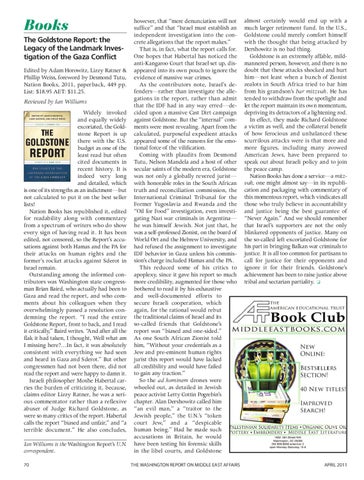book_review_70_Book Review 3/2/11 12:28 PM Page 70
Books The Goldstone Report: the Legacy of the Landmark Investigation of the Gaza Conflict Edited by Adam Horowitz, Lizzy Ratner & Phillip Weiss, foreword by Desmond Tutu, Nation Books, 2011, paperback, 449 pp. List: $18.95 AET: $11.25. Reviewed by Ian Williams Widely invoked and equally widely excoriated, the Goldstone Report is up there with the U.S. budget as one of the least read but often cited documents in recent history. It is indeed very long and detailed, which is one of its strengths as an indictment—but not calculated to put it on the best seller lists! Nation Books has republished it, edited for readability along with commentary from a spectrum of writers who do show every sign of having read it. It has been edited, not censored, so the Report’s accusations against both Hamas and the PA for their attacks on human rights and the former’s rocket attacks against Sderot in Israel remain. Outstanding among the informed contributors was Washington state congressman Brian Baird, who actually had been to Gaza and read the report, and who comments about his colleagues when they overwhelmingly passed a resolution condemning the report. “I read the entire Goldstone Report, front to back, and I read it critically,” Baird writes. “And after all the flak it had taken, I thought, Well what am I missing here?…In fact, it was absolutely consistent with everything we had seen and heard in Gaza and Sderot.” But other congressmen had not been there, did not read the report and were happy to damn it. Israeli philosopher Moshe Habertal carries the burden of criticizing it, because, claims editor Lizzy Ratner, he was a serious commentator rather than a reflexive abuser of Judge Richard Goldstone, as were so many critics of the report. Habertal calls the report “biased and unfair,” and “a terrible document.” He also concludes, Ian Williams is the Washington Report’s U.N. correspondent. 70
however, that “mere denunciation will not suffice” and that “Israel must establish an independent investigation into the concrete allegations that the report makes.” That is, in fact, what the report calls for. One hopes that Habertal has noticed the anti-Kangaroo Court that Israel set up, disappeared into its own pouch to ignore the evidence of massive war crimes. As the contributors note, Israel’s defenders—rather than investigate the allegations in the report, rather than admit that the IDF had in any way erred—decided upon a massive Cast Dirt campaign against Goldstone. But the “internal” comments were most revealing. Apart from the calculated, purposeful expedient attacks appeared some of the reasons for the emotional force of the vilification. Coming with plaudits from Desmond Tutu, Nelson Mandela and a host of other secular saints of the modern era, Goldstone was not only a globally revered jurist— with honorable roles in the South African truth and reconciliation commission, the International Criminal Tribunal for the Former Yugoslavia and Rwanda and the “Oil for Food” investigation, even investigating Nazi war criminals in Argentina— he was himself Jewish. Not just that, he was a self-professed Zionist, on the board of World Ort and the Hebrew University, and had refused the assignment to investigate IDF behavior in Gaza unless his commission’s charge included Hamas and the PA. This reduced some of his critics to apoplexy, since it gave his report so much more credibility, augmented for those who bothered to read it by his exhaustive and well-documented efforts to secure Israeli cooperation, which again, for the rational would rebut the traditional claims of Israel and its so-called friends that Goldstone’s report was “biased and one-sided.” As one South African Zionist told him, “Without your credentials as a Jew and pre-eminent human rights jurist this report would have lacked all credibility and would have failed to gain any traction.” So the ad hominem drones were wheeled out, as detailed in Jewish peace activist Letty Cottin Pogrebin’s chapter. Alan Dershowitz called him “an evil man,” a “traitor to the Jewish people,” the U.N.’s “token court Jew,” and a “despicable human being.” Had he made such accusations in Britain, he would have been testing his forensic skills in the libel courts, and Goldstone THE WASHINGTON REPORT ON MIDDLE EAST AFFAIRS
almost certainly would end up with a much larger retirement fund. In the U.S., Goldstone could merely comfort himself with the thought that being attacked by Dershowitz is no bad thing. Goldstone is an extremely affable, mildmannered person, however, and there is no doubt that these attacks shocked and hurt him—not least when a bunch of Zionist zealots in South Africa tried to bar him from his grandson’s bar mitzvah. He has tended to withdraw from the spotlight and let the report maintain its own momentum, depriving its detractors of a lightening rod. In effect, they made Richard Goldstone a victim as well, and the collateral benefit of how ferocious and unbalanced these scurrilous attacks were is that more and more figures, including many avowed American Jews, have been prepared to speak out about Israeli policy and to join the peace camp. Nation Books has done a service—a mitzvah, one might almost say—in its republication and packaging with commentary of this momentous report, which vindicates all those who truly believe in accountability and justice being the best guarantee of “Never Again.” And we should remember that Israel’s supporters are not the only blinkered opponents of justice. Many on the so-called left excoriated Goldstone for his part in bringing Balkan war criminals to justice. It is all too common for partisans to call for justice for their opponents and ignore it for their friends. Goldstone’s achievement has been to raise justice above tribal and sectarian partiality. ❑
APRIL 2011
